Examples of Conversational AI Use Cases in Business
Examples of Conversational AI Use Cases in Business
Examples of Conversational AI Use Cases in Business
See how AI chatbots & virtual assistants are revolutionizing businesses! Discover use cases for customer service, marketing, HR & more.
See how AI chatbots & virtual assistants are revolutionizing businesses! Discover use cases for customer service, marketing, HR & more.
See how AI chatbots & virtual assistants are revolutionizing businesses! Discover use cases for customer service, marketing, HR & more.



You're in bustling New York City, hungry for a delicious pizza, but with countless options overwhelming you.
In just a few taps, you chat with a restaurant's AI assistant. This AI uses your dietary preferences, current location, and even real-time reviews to suggest the perfect pizza place.
Within minutes, you're enjoying a fantastic slice, all thanks to the power of conversational AI.
Not just that! Imagine a world where conversations power everything you do:
Need instant banking help? Chat with your bank's AI assistant.
Planning a trip? A tireless virtual assistant curates personalized recommendations.
Want to learn a new language? Interactive chat sessions make it fun and engaging.
Did you know? By 2027, Gartner predicts that more than half of all customer service interactions will be handled by AI chatbots. Conversational AI isn't some futuristic dream, it's happening now.
This is the reality that conversational AI is creating. It's fundamentally changing how businesses interact with customers and even how they operate internally.
This guide dives deep into the exciting world of conversational AI in business. We'll explore its impact across different industries, from making customer service a breeze to improving employee experiences.
Conversational AI, also known as conversational interfaces, is revolutionizing how businesses interact with customers and employees. Imagine intelligent chatbots that can answer your questions, complete tasks, and even understand your emotions. This is the power of conversational AI, and it's rapidly transforming business operations across various industries.
What is Conversational AI and How Does it Boost Business Operations?

Conversational AI utilizes technologies like natural language processing (NLP) to understand and respond to human communication, be it through text or voice. It acts as a virtual assistant, engaging in conversations that mimic real human interaction.
Here's how conversational AI boosts business operations:
Enhanced Customer Service: Imagine Nadia's restaurant reservation conversation – chatbots can handle routine inquiries, freeing human agents for complex issues. This leads to faster resolution times and improved customer satisfaction.
Increased Efficiency: Conversational AI automates repetitive tasks, allowing employees to focus on higher-value activities. For instance, chatbots can answer FAQs, schedule appointments, or process basic orders.
24/7 Availability: Unlike human agents, conversational AI is always available. This provides consistent customer support around the clock, catering to a global audience.
Data-Driven Insights: Conversational AI captures valuable data from customer interactions. Businesses can analyze this data to understand customer needs, preferences, and sentiment, leading to better product development and marketing strategies.
Integrating Speech Recognition and Sentiment Analysis
Conversational AI goes beyond text-based interactions. By integrating speech recognition technology, businesses can enable voice-activated chatbots, making interactions more natural and hands-free.
Sentiment analysis is another powerful tool. Businesses can personalize their responses and provide a more empathetic customer experience by analyzing the tone and emotions conveyed in conversations.
Conversational AI is not just a trend; it's the future of business interactions. By understanding its capabilities and potential, businesses can unlock a new level of efficiency, customer satisfaction, and growth.
Incorporating conversational AI into business operations, especially through AI-powered forms, can heighten understanding and response to customer needs. Metaforms offers an innovative way to leverage AI for collecting more relevant, actionable data, propelling your business towards making better-informed decisions.
Technologies Behind Conversational AI

Conversational AI isn't magic; it's a powerful combination of cutting-edge technologies. Let's delve into the key players that make these intelligent conversations possible:
1. Natural Language Processing (NLP)
Imagine trying to have a conversation without understanding the meaning of words! NLP acts as the brain of conversational AI, enabling it to understand the nuances of human language. NLP techniques like text analysis, sentiment analysis, and intent recognition allow the AI to decipher the meaning behind our words, even accounting for slang, sarcasm, and varying sentence structures. This is what allows Nadia's virtual concierge to understand her desire for a trendy restaurant, not just a place to eat.
2. Machine Learning (ML) and Deep Learning (DL)
Machine learning is the engine that drives conversational AI's ability to learn and improve over time. By analyzing vast amounts of data from past conversations, the AI can identify patterns and predict user behavior. This allows for more accurate responses, personalized recommendations, and even proactive assistance.
Deep learning, a subset of ML using complex artificial neural networks, further enhances this capability by enabling the AI to learn even more intricate relationships within the data.
3. Automatic Speech Recognition (ASR) and its Applications:
Conversational AI isn't limited to text chats. Automatic Speech Recognition (ASR) allows AI to convert spoken language into text, enabling voice-activated interactions. This opens doors for hands-free experiences like using a smart speaker to book a restaurant reservation or get directions while driving.
Customer Service Enhancement
Customer service is the cornerstone of any successful business. Conversational AI is revolutionizing this domain, offering a range of benefits that enhance accessibility, efficiency, and overall customer satisfaction.
Conversational AI chatbots can provide 24/7 support, ensuring everyone can get help whenever they need it. This is especially helpful for customers in different time zones or with disabilities who might find traditional phone support challenging.
Chatbots excel at handling frequently asked questions (FAQs) and routine tasks like account management. This frees up human agents to focus on complex issues and provide more personalized assistance.
Conversational AI streamlines the booking process. Chatbots can handle restaurant reservations, flight bookings, or even schedule appointments, saving customers time and effort.
Catering to a global audience? Conversational AI chatbots can be programmed to communicate in multiple languages, removing language barriers and ensuring all customers receive exceptional service.
Unlike human agents, chatbots are always available. This provides consistent customer support around the clock, ensuring customers can get help whenever they need it, regardless of the time zone.
Sales and Marketing Optimization

In today's competitive landscape, businesses need to optimize their sales and marketing efforts. Conversational AI offers a powerful toolkit to achieve this, fostering deeper customer engagement, streamlining processes, and ultimately driving growth.
Personalized Product Recommendations based on Customer Data: Conversational AI chatbots can analyze customer data, including purchase history, browsing behavior, and preferences. This allows them to offer personalized product recommendations that resonate with each customer's unique needs.
Automating the Sales Process for Efficiency: Conversational AI can automate repetitive tasks in the sales funnel, such as qualifying leads, scheduling meetings, and answering basic product inquiries. This frees up valuable time for sales reps to focus on nurturing leads, building relationships, and closing deals.
Utilizing Conversational AI for Lead Generation and Deal Closure: Chatbots can act as virtual salespeople, engaging website visitors, capturing leads, and even answering sales-related questions. They can also qualify leads by prompting them with specific questions, allowing sales reps to focus on high-potential prospects. Furthermore, chatbots can guide qualified leads through the sales process, providing information, addressing concerns, and even offering special promotions, ultimately facilitating deal closure.
Improved Engagement through Automated Customer Interactions: Conversational AI enables proactive customer interactions. Chatbots can initiate conversations with website visitors, answer questions, and offer personalized support. This continuous engagement keeps potential customers interested and fosters brand loyalty.
Operational Efficiency in Banking and Finance
The banking and finance industry thrives on efficiency and security. Conversational AI presents a powerful opportunity to streamline operations, enhance customer service, and even improve fraud detection.
Automated Customer Service and Account Management: Conversational AI chatbots can handle routine customer inquiries about account balances, transactions, and bill payments. This frees up human agents to focus on complex financial issues and provide personalized guidance. Imagine a customer using a chatbot to check their bank balance or transfer funds between accounts – all within the convenience of a mobile app.
Fraud Detection through Pattern Analysis: While conversational AI can assist in identifying patterns indicative of fraud, it's often part of a larger system of fraud detection that includes other types of AI and analytics.
AI systems can identify anomalies that might indicate fraudulent activity by analyzing conversation patterns and user behavior. This allows banks to take preventative measures and protect customer accounts.Enhanced Data Analysis for Personalized Financial Advice: Conversational AI chatbots can leverage vast amounts of customer data to provide personalized financial advice. By analyzing spending habits, financial goals, and risk tolerance, chatbots can recommend suitable investment options, budgeting strategies, and savings plans. This empowers customers to make informed financial decisions and achieve their financial goals.
Retail Sector Innovations
The retail landscape is undergoing a dramatic transformation. Conversational AI is at the forefront of this change, revolutionizing the way customers shop and interact with brands.
Conversational AI chatbots can streamline the ordering process, allowing customers to place orders, track deliveries, and even receive product recommendations based on their past purchases.
This not only enhances the customer experience but also simplifies inventory management for retailers.Conversational AI chatbots provide 24/7 customer support, answering product inquiries, resolving issues, and guiding customers through the shopping journey.
This goes beyond basic support; chatbots can leverage customer data and purchase history to offer personalized recommendations, suggesting complementary products or highlighting ongoing promotions relevant to the customer's interests.Conversational AI plays a crucial role in online retail. Chatbots can assist with size and fit recommendations, address return and exchange queries, and even track order status.
This not only simplifies the online shopping experience but also reduces customer frustration and boosts overall satisfaction.
Healthcare Applications
The healthcare industry is constantly seeking ways to improve patient care, streamline processes, and increase accessibility. Conversational AI offers a range of benefits that can revolutionize the healthcare landscape.
Conversational AI chatbots can act as a preliminary diagnostic tool. By engaging in symptom-checking conversations and gathering relevant medical information, chatbots can guide patients towards appropriate care channels, potentially reducing unnecessary emergency room visits. This doesn't replace professional medical advice, but it empowers patients to make informed decisions about their health.
Conversational AI chatbots can automate administrative tasks such as appointment scheduling, prescription refills, and insurance inquiries. This frees up valuable time for medical professionals, allowing them to focus on providing high-quality care to their patients.
Conversational AI chatbots provide 24/7 patient service, offering basic medical information, answering frequently asked questions, and directing patients to appropriate resources. This not only improves accessibility for patients but also reduces the burden on healthcare professionals by addressing non-urgent inquiries outside of regular office hours.
Conversational AI in Education
The education sector is ripe for innovation, and conversational AI is emerging as a powerful tool to personalize learning experiences, streamline administrative tasks, and enhance overall educational outcomes.
Conversational AI chatbots can automate routine administrative tasks such as answering student queries about schedules, assignments, and course registration.
This frees up educators' time for more strategic initiatives like lesson planning and personalized student support.
Imagine students using a chatbot to check their class schedule or submit basic questions about homework assignments, allowing teachers to focus on more in-depth discussions and individual student needs.
Conversational AI can personalize the learning experience for each student. Chatbots can adapt to individual learning styles, provide targeted practice exercises, and offer feedback based on student progress.
This allows students to learn at their own pace and focus on areas that require additional support. .Conversational AI chatbots can create engaging and interactive language learning experiences. Students can practice conversation skills by interacting with the chatbot, receive real-time feedback on their pronunciation and grammar, and learn new vocabulary in a context-rich environment.
Enhancing Employee Experience
Employee experience is paramount for business success. Conversational AI offers a compelling solution to improve employee satisfaction, streamline processes, and foster a more engaged workforce.
Automated HR Query Response for Faster Support: Conversational AI chatbots can handle routine HR inquiries about benefits, payroll, and company policies. This frees up HR professionals to focus on complex issues and provide more personalized support to employees.
Conversational AI chatbots can guide new hires through the onboarding process, answering questions about company culture, benefits, and office logistics. Chatbots can also deliver bite-sized training modules, allowing employees to learn at their own pace and retain information more effectively.
Conversational AI can facilitate communication and collaboration within teams. Chatbots can be integrated with project management tools, enabling team members to share updates, track progress, and ask questions in real-time.
Data Collection and Analysis
Conversational AI isn't just about interactions; it's also about gleaning valuable insights from those conversations. By collecting and analyzing customer data, businesses can gain a deeper understanding of their audience, improve service offerings, and ultimately drive growth.
Gathering and Analyzing Customer Feedback for Insights: Conversational AI chatbots can act as a continuous feedback loop. They can prompt customers for feedback after interactions, gather sentiment analysis data from conversations, and even conduct surveys within the chat interface.
This allows businesses to collect valuable insights into customer satisfaction, product preferences, and areas for improvement.
Tracking and Analyzing Customer Interactions for Improved Service: Conversational AI enables businesses to track and analyze all customer interactions. Businesses can identify common customer pain points, frequently asked questions, and even buying patterns. This data can be used to refine chatbots' responses, personalize customer journeys, and ultimately improve the overall service experience.
For instance, by analyzing Nadia's restaurant reservation conversation, the chatbot might identify a preference for specific cuisines or dietary restrictions. This information can then be used to personalize future restaurant recommendations, ensuring a more satisfying dining experience.
By leveraging data collection and analysis, conversational AI provides businesses with a treasure trove of customer insights. This empowers them to make data-driven decisions, personalize interactions, and ultimately build stronger customer relationships.
Challenges and Future Prospects
Conversational AI promises a revolutionized future of human-computer interaction. However, it's important to acknowledge the challenges that need to be addressed and the exciting advancements on the horizon.
Addressing Privacy and Security Concerns: Conversational AI collects vast amounts of customer data. Businesses need to ensure robust security measures are in place to protect sensitive information. Additionally, clear and transparent data privacy practices are crucial to maintain user trust.
Predictions for Future Advancements in Conversational AI: The field of conversational AI is constantly evolving. The future holds exciting possibilities, such as the development of even more sophisticated NLP capabilities that enable nuanced understanding of human emotions and context.
The capability of AI to "understand" human emotions is based on interpreting sentiment analysis data rather than a genuine comprehension of human feelings. The current technology allows for response pattern adjustments based on the analyzed sentiment of user inputs, which is not the same as understanding emotions in a human context.
Advancements in AI explainability will also be crucial, allowing users to understand the reasoning behind the AI's responses and fostering greater trust in the technology.
Incorporating Continuous Learning and Improvement Cycles: For conversational AI to reach its full potential, continuous learning and improvement are essential. This involves incorporating feedback loops to gather user data and refine the AI's responses over time.
By addressing these challenges and embracing future advancements, conversational AI can unlock a new era of intelligent and personalized interactions across various industries. As conversational AI continues to evolve, the possibilities for enhanced customer service, streamlined operations, and a more engaging user experience are truly limitless.
As conversational AI platforms strive for continuous learning and improvement, the adoption of AI tools like Metaforms that excel in asking the right questions and actively listening can significantly refine the quality of data collected, thereby enhancing the AI's efficiency and personalization capabilities over time.
You're in bustling New York City, hungry for a delicious pizza, but with countless options overwhelming you.
In just a few taps, you chat with a restaurant's AI assistant. This AI uses your dietary preferences, current location, and even real-time reviews to suggest the perfect pizza place.
Within minutes, you're enjoying a fantastic slice, all thanks to the power of conversational AI.
Not just that! Imagine a world where conversations power everything you do:
Need instant banking help? Chat with your bank's AI assistant.
Planning a trip? A tireless virtual assistant curates personalized recommendations.
Want to learn a new language? Interactive chat sessions make it fun and engaging.
Did you know? By 2027, Gartner predicts that more than half of all customer service interactions will be handled by AI chatbots. Conversational AI isn't some futuristic dream, it's happening now.
This is the reality that conversational AI is creating. It's fundamentally changing how businesses interact with customers and even how they operate internally.
This guide dives deep into the exciting world of conversational AI in business. We'll explore its impact across different industries, from making customer service a breeze to improving employee experiences.
Conversational AI, also known as conversational interfaces, is revolutionizing how businesses interact with customers and employees. Imagine intelligent chatbots that can answer your questions, complete tasks, and even understand your emotions. This is the power of conversational AI, and it's rapidly transforming business operations across various industries.
What is Conversational AI and How Does it Boost Business Operations?

Conversational AI utilizes technologies like natural language processing (NLP) to understand and respond to human communication, be it through text or voice. It acts as a virtual assistant, engaging in conversations that mimic real human interaction.
Here's how conversational AI boosts business operations:
Enhanced Customer Service: Imagine Nadia's restaurant reservation conversation – chatbots can handle routine inquiries, freeing human agents for complex issues. This leads to faster resolution times and improved customer satisfaction.
Increased Efficiency: Conversational AI automates repetitive tasks, allowing employees to focus on higher-value activities. For instance, chatbots can answer FAQs, schedule appointments, or process basic orders.
24/7 Availability: Unlike human agents, conversational AI is always available. This provides consistent customer support around the clock, catering to a global audience.
Data-Driven Insights: Conversational AI captures valuable data from customer interactions. Businesses can analyze this data to understand customer needs, preferences, and sentiment, leading to better product development and marketing strategies.
Integrating Speech Recognition and Sentiment Analysis
Conversational AI goes beyond text-based interactions. By integrating speech recognition technology, businesses can enable voice-activated chatbots, making interactions more natural and hands-free.
Sentiment analysis is another powerful tool. Businesses can personalize their responses and provide a more empathetic customer experience by analyzing the tone and emotions conveyed in conversations.
Conversational AI is not just a trend; it's the future of business interactions. By understanding its capabilities and potential, businesses can unlock a new level of efficiency, customer satisfaction, and growth.
Incorporating conversational AI into business operations, especially through AI-powered forms, can heighten understanding and response to customer needs. Metaforms offers an innovative way to leverage AI for collecting more relevant, actionable data, propelling your business towards making better-informed decisions.
Technologies Behind Conversational AI

Conversational AI isn't magic; it's a powerful combination of cutting-edge technologies. Let's delve into the key players that make these intelligent conversations possible:
1. Natural Language Processing (NLP)
Imagine trying to have a conversation without understanding the meaning of words! NLP acts as the brain of conversational AI, enabling it to understand the nuances of human language. NLP techniques like text analysis, sentiment analysis, and intent recognition allow the AI to decipher the meaning behind our words, even accounting for slang, sarcasm, and varying sentence structures. This is what allows Nadia's virtual concierge to understand her desire for a trendy restaurant, not just a place to eat.
2. Machine Learning (ML) and Deep Learning (DL)
Machine learning is the engine that drives conversational AI's ability to learn and improve over time. By analyzing vast amounts of data from past conversations, the AI can identify patterns and predict user behavior. This allows for more accurate responses, personalized recommendations, and even proactive assistance.
Deep learning, a subset of ML using complex artificial neural networks, further enhances this capability by enabling the AI to learn even more intricate relationships within the data.
3. Automatic Speech Recognition (ASR) and its Applications:
Conversational AI isn't limited to text chats. Automatic Speech Recognition (ASR) allows AI to convert spoken language into text, enabling voice-activated interactions. This opens doors for hands-free experiences like using a smart speaker to book a restaurant reservation or get directions while driving.
Customer Service Enhancement
Customer service is the cornerstone of any successful business. Conversational AI is revolutionizing this domain, offering a range of benefits that enhance accessibility, efficiency, and overall customer satisfaction.
Conversational AI chatbots can provide 24/7 support, ensuring everyone can get help whenever they need it. This is especially helpful for customers in different time zones or with disabilities who might find traditional phone support challenging.
Chatbots excel at handling frequently asked questions (FAQs) and routine tasks like account management. This frees up human agents to focus on complex issues and provide more personalized assistance.
Conversational AI streamlines the booking process. Chatbots can handle restaurant reservations, flight bookings, or even schedule appointments, saving customers time and effort.
Catering to a global audience? Conversational AI chatbots can be programmed to communicate in multiple languages, removing language barriers and ensuring all customers receive exceptional service.
Unlike human agents, chatbots are always available. This provides consistent customer support around the clock, ensuring customers can get help whenever they need it, regardless of the time zone.
Sales and Marketing Optimization

In today's competitive landscape, businesses need to optimize their sales and marketing efforts. Conversational AI offers a powerful toolkit to achieve this, fostering deeper customer engagement, streamlining processes, and ultimately driving growth.
Personalized Product Recommendations based on Customer Data: Conversational AI chatbots can analyze customer data, including purchase history, browsing behavior, and preferences. This allows them to offer personalized product recommendations that resonate with each customer's unique needs.
Automating the Sales Process for Efficiency: Conversational AI can automate repetitive tasks in the sales funnel, such as qualifying leads, scheduling meetings, and answering basic product inquiries. This frees up valuable time for sales reps to focus on nurturing leads, building relationships, and closing deals.
Utilizing Conversational AI for Lead Generation and Deal Closure: Chatbots can act as virtual salespeople, engaging website visitors, capturing leads, and even answering sales-related questions. They can also qualify leads by prompting them with specific questions, allowing sales reps to focus on high-potential prospects. Furthermore, chatbots can guide qualified leads through the sales process, providing information, addressing concerns, and even offering special promotions, ultimately facilitating deal closure.
Improved Engagement through Automated Customer Interactions: Conversational AI enables proactive customer interactions. Chatbots can initiate conversations with website visitors, answer questions, and offer personalized support. This continuous engagement keeps potential customers interested and fosters brand loyalty.
Operational Efficiency in Banking and Finance
The banking and finance industry thrives on efficiency and security. Conversational AI presents a powerful opportunity to streamline operations, enhance customer service, and even improve fraud detection.
Automated Customer Service and Account Management: Conversational AI chatbots can handle routine customer inquiries about account balances, transactions, and bill payments. This frees up human agents to focus on complex financial issues and provide personalized guidance. Imagine a customer using a chatbot to check their bank balance or transfer funds between accounts – all within the convenience of a mobile app.
Fraud Detection through Pattern Analysis: While conversational AI can assist in identifying patterns indicative of fraud, it's often part of a larger system of fraud detection that includes other types of AI and analytics.
AI systems can identify anomalies that might indicate fraudulent activity by analyzing conversation patterns and user behavior. This allows banks to take preventative measures and protect customer accounts.Enhanced Data Analysis for Personalized Financial Advice: Conversational AI chatbots can leverage vast amounts of customer data to provide personalized financial advice. By analyzing spending habits, financial goals, and risk tolerance, chatbots can recommend suitable investment options, budgeting strategies, and savings plans. This empowers customers to make informed financial decisions and achieve their financial goals.
Retail Sector Innovations
The retail landscape is undergoing a dramatic transformation. Conversational AI is at the forefront of this change, revolutionizing the way customers shop and interact with brands.
Conversational AI chatbots can streamline the ordering process, allowing customers to place orders, track deliveries, and even receive product recommendations based on their past purchases.
This not only enhances the customer experience but also simplifies inventory management for retailers.Conversational AI chatbots provide 24/7 customer support, answering product inquiries, resolving issues, and guiding customers through the shopping journey.
This goes beyond basic support; chatbots can leverage customer data and purchase history to offer personalized recommendations, suggesting complementary products or highlighting ongoing promotions relevant to the customer's interests.Conversational AI plays a crucial role in online retail. Chatbots can assist with size and fit recommendations, address return and exchange queries, and even track order status.
This not only simplifies the online shopping experience but also reduces customer frustration and boosts overall satisfaction.
Healthcare Applications
The healthcare industry is constantly seeking ways to improve patient care, streamline processes, and increase accessibility. Conversational AI offers a range of benefits that can revolutionize the healthcare landscape.
Conversational AI chatbots can act as a preliminary diagnostic tool. By engaging in symptom-checking conversations and gathering relevant medical information, chatbots can guide patients towards appropriate care channels, potentially reducing unnecessary emergency room visits. This doesn't replace professional medical advice, but it empowers patients to make informed decisions about their health.
Conversational AI chatbots can automate administrative tasks such as appointment scheduling, prescription refills, and insurance inquiries. This frees up valuable time for medical professionals, allowing them to focus on providing high-quality care to their patients.
Conversational AI chatbots provide 24/7 patient service, offering basic medical information, answering frequently asked questions, and directing patients to appropriate resources. This not only improves accessibility for patients but also reduces the burden on healthcare professionals by addressing non-urgent inquiries outside of regular office hours.
Conversational AI in Education
The education sector is ripe for innovation, and conversational AI is emerging as a powerful tool to personalize learning experiences, streamline administrative tasks, and enhance overall educational outcomes.
Conversational AI chatbots can automate routine administrative tasks such as answering student queries about schedules, assignments, and course registration.
This frees up educators' time for more strategic initiatives like lesson planning and personalized student support.
Imagine students using a chatbot to check their class schedule or submit basic questions about homework assignments, allowing teachers to focus on more in-depth discussions and individual student needs.
Conversational AI can personalize the learning experience for each student. Chatbots can adapt to individual learning styles, provide targeted practice exercises, and offer feedback based on student progress.
This allows students to learn at their own pace and focus on areas that require additional support. .Conversational AI chatbots can create engaging and interactive language learning experiences. Students can practice conversation skills by interacting with the chatbot, receive real-time feedback on their pronunciation and grammar, and learn new vocabulary in a context-rich environment.
Enhancing Employee Experience
Employee experience is paramount for business success. Conversational AI offers a compelling solution to improve employee satisfaction, streamline processes, and foster a more engaged workforce.
Automated HR Query Response for Faster Support: Conversational AI chatbots can handle routine HR inquiries about benefits, payroll, and company policies. This frees up HR professionals to focus on complex issues and provide more personalized support to employees.
Conversational AI chatbots can guide new hires through the onboarding process, answering questions about company culture, benefits, and office logistics. Chatbots can also deliver bite-sized training modules, allowing employees to learn at their own pace and retain information more effectively.
Conversational AI can facilitate communication and collaboration within teams. Chatbots can be integrated with project management tools, enabling team members to share updates, track progress, and ask questions in real-time.
Data Collection and Analysis
Conversational AI isn't just about interactions; it's also about gleaning valuable insights from those conversations. By collecting and analyzing customer data, businesses can gain a deeper understanding of their audience, improve service offerings, and ultimately drive growth.
Gathering and Analyzing Customer Feedback for Insights: Conversational AI chatbots can act as a continuous feedback loop. They can prompt customers for feedback after interactions, gather sentiment analysis data from conversations, and even conduct surveys within the chat interface.
This allows businesses to collect valuable insights into customer satisfaction, product preferences, and areas for improvement.
Tracking and Analyzing Customer Interactions for Improved Service: Conversational AI enables businesses to track and analyze all customer interactions. Businesses can identify common customer pain points, frequently asked questions, and even buying patterns. This data can be used to refine chatbots' responses, personalize customer journeys, and ultimately improve the overall service experience.
For instance, by analyzing Nadia's restaurant reservation conversation, the chatbot might identify a preference for specific cuisines or dietary restrictions. This information can then be used to personalize future restaurant recommendations, ensuring a more satisfying dining experience.
By leveraging data collection and analysis, conversational AI provides businesses with a treasure trove of customer insights. This empowers them to make data-driven decisions, personalize interactions, and ultimately build stronger customer relationships.
Challenges and Future Prospects
Conversational AI promises a revolutionized future of human-computer interaction. However, it's important to acknowledge the challenges that need to be addressed and the exciting advancements on the horizon.
Addressing Privacy and Security Concerns: Conversational AI collects vast amounts of customer data. Businesses need to ensure robust security measures are in place to protect sensitive information. Additionally, clear and transparent data privacy practices are crucial to maintain user trust.
Predictions for Future Advancements in Conversational AI: The field of conversational AI is constantly evolving. The future holds exciting possibilities, such as the development of even more sophisticated NLP capabilities that enable nuanced understanding of human emotions and context.
The capability of AI to "understand" human emotions is based on interpreting sentiment analysis data rather than a genuine comprehension of human feelings. The current technology allows for response pattern adjustments based on the analyzed sentiment of user inputs, which is not the same as understanding emotions in a human context.
Advancements in AI explainability will also be crucial, allowing users to understand the reasoning behind the AI's responses and fostering greater trust in the technology.
Incorporating Continuous Learning and Improvement Cycles: For conversational AI to reach its full potential, continuous learning and improvement are essential. This involves incorporating feedback loops to gather user data and refine the AI's responses over time.
By addressing these challenges and embracing future advancements, conversational AI can unlock a new era of intelligent and personalized interactions across various industries. As conversational AI continues to evolve, the possibilities for enhanced customer service, streamlined operations, and a more engaging user experience are truly limitless.
As conversational AI platforms strive for continuous learning and improvement, the adoption of AI tools like Metaforms that excel in asking the right questions and actively listening can significantly refine the quality of data collected, thereby enhancing the AI's efficiency and personalization capabilities over time.
You're in bustling New York City, hungry for a delicious pizza, but with countless options overwhelming you.
In just a few taps, you chat with a restaurant's AI assistant. This AI uses your dietary preferences, current location, and even real-time reviews to suggest the perfect pizza place.
Within minutes, you're enjoying a fantastic slice, all thanks to the power of conversational AI.
Not just that! Imagine a world where conversations power everything you do:
Need instant banking help? Chat with your bank's AI assistant.
Planning a trip? A tireless virtual assistant curates personalized recommendations.
Want to learn a new language? Interactive chat sessions make it fun and engaging.
Did you know? By 2027, Gartner predicts that more than half of all customer service interactions will be handled by AI chatbots. Conversational AI isn't some futuristic dream, it's happening now.
This is the reality that conversational AI is creating. It's fundamentally changing how businesses interact with customers and even how they operate internally.
This guide dives deep into the exciting world of conversational AI in business. We'll explore its impact across different industries, from making customer service a breeze to improving employee experiences.
Conversational AI, also known as conversational interfaces, is revolutionizing how businesses interact with customers and employees. Imagine intelligent chatbots that can answer your questions, complete tasks, and even understand your emotions. This is the power of conversational AI, and it's rapidly transforming business operations across various industries.
What is Conversational AI and How Does it Boost Business Operations?

Conversational AI utilizes technologies like natural language processing (NLP) to understand and respond to human communication, be it through text or voice. It acts as a virtual assistant, engaging in conversations that mimic real human interaction.
Here's how conversational AI boosts business operations:
Enhanced Customer Service: Imagine Nadia's restaurant reservation conversation – chatbots can handle routine inquiries, freeing human agents for complex issues. This leads to faster resolution times and improved customer satisfaction.
Increased Efficiency: Conversational AI automates repetitive tasks, allowing employees to focus on higher-value activities. For instance, chatbots can answer FAQs, schedule appointments, or process basic orders.
24/7 Availability: Unlike human agents, conversational AI is always available. This provides consistent customer support around the clock, catering to a global audience.
Data-Driven Insights: Conversational AI captures valuable data from customer interactions. Businesses can analyze this data to understand customer needs, preferences, and sentiment, leading to better product development and marketing strategies.
Integrating Speech Recognition and Sentiment Analysis
Conversational AI goes beyond text-based interactions. By integrating speech recognition technology, businesses can enable voice-activated chatbots, making interactions more natural and hands-free.
Sentiment analysis is another powerful tool. Businesses can personalize their responses and provide a more empathetic customer experience by analyzing the tone and emotions conveyed in conversations.
Conversational AI is not just a trend; it's the future of business interactions. By understanding its capabilities and potential, businesses can unlock a new level of efficiency, customer satisfaction, and growth.
Incorporating conversational AI into business operations, especially through AI-powered forms, can heighten understanding and response to customer needs. Metaforms offers an innovative way to leverage AI for collecting more relevant, actionable data, propelling your business towards making better-informed decisions.
Technologies Behind Conversational AI

Conversational AI isn't magic; it's a powerful combination of cutting-edge technologies. Let's delve into the key players that make these intelligent conversations possible:
1. Natural Language Processing (NLP)
Imagine trying to have a conversation without understanding the meaning of words! NLP acts as the brain of conversational AI, enabling it to understand the nuances of human language. NLP techniques like text analysis, sentiment analysis, and intent recognition allow the AI to decipher the meaning behind our words, even accounting for slang, sarcasm, and varying sentence structures. This is what allows Nadia's virtual concierge to understand her desire for a trendy restaurant, not just a place to eat.
2. Machine Learning (ML) and Deep Learning (DL)
Machine learning is the engine that drives conversational AI's ability to learn and improve over time. By analyzing vast amounts of data from past conversations, the AI can identify patterns and predict user behavior. This allows for more accurate responses, personalized recommendations, and even proactive assistance.
Deep learning, a subset of ML using complex artificial neural networks, further enhances this capability by enabling the AI to learn even more intricate relationships within the data.
3. Automatic Speech Recognition (ASR) and its Applications:
Conversational AI isn't limited to text chats. Automatic Speech Recognition (ASR) allows AI to convert spoken language into text, enabling voice-activated interactions. This opens doors for hands-free experiences like using a smart speaker to book a restaurant reservation or get directions while driving.
Customer Service Enhancement
Customer service is the cornerstone of any successful business. Conversational AI is revolutionizing this domain, offering a range of benefits that enhance accessibility, efficiency, and overall customer satisfaction.
Conversational AI chatbots can provide 24/7 support, ensuring everyone can get help whenever they need it. This is especially helpful for customers in different time zones or with disabilities who might find traditional phone support challenging.
Chatbots excel at handling frequently asked questions (FAQs) and routine tasks like account management. This frees up human agents to focus on complex issues and provide more personalized assistance.
Conversational AI streamlines the booking process. Chatbots can handle restaurant reservations, flight bookings, or even schedule appointments, saving customers time and effort.
Catering to a global audience? Conversational AI chatbots can be programmed to communicate in multiple languages, removing language barriers and ensuring all customers receive exceptional service.
Unlike human agents, chatbots are always available. This provides consistent customer support around the clock, ensuring customers can get help whenever they need it, regardless of the time zone.
Sales and Marketing Optimization

In today's competitive landscape, businesses need to optimize their sales and marketing efforts. Conversational AI offers a powerful toolkit to achieve this, fostering deeper customer engagement, streamlining processes, and ultimately driving growth.
Personalized Product Recommendations based on Customer Data: Conversational AI chatbots can analyze customer data, including purchase history, browsing behavior, and preferences. This allows them to offer personalized product recommendations that resonate with each customer's unique needs.
Automating the Sales Process for Efficiency: Conversational AI can automate repetitive tasks in the sales funnel, such as qualifying leads, scheduling meetings, and answering basic product inquiries. This frees up valuable time for sales reps to focus on nurturing leads, building relationships, and closing deals.
Utilizing Conversational AI for Lead Generation and Deal Closure: Chatbots can act as virtual salespeople, engaging website visitors, capturing leads, and even answering sales-related questions. They can also qualify leads by prompting them with specific questions, allowing sales reps to focus on high-potential prospects. Furthermore, chatbots can guide qualified leads through the sales process, providing information, addressing concerns, and even offering special promotions, ultimately facilitating deal closure.
Improved Engagement through Automated Customer Interactions: Conversational AI enables proactive customer interactions. Chatbots can initiate conversations with website visitors, answer questions, and offer personalized support. This continuous engagement keeps potential customers interested and fosters brand loyalty.
Operational Efficiency in Banking and Finance
The banking and finance industry thrives on efficiency and security. Conversational AI presents a powerful opportunity to streamline operations, enhance customer service, and even improve fraud detection.
Automated Customer Service and Account Management: Conversational AI chatbots can handle routine customer inquiries about account balances, transactions, and bill payments. This frees up human agents to focus on complex financial issues and provide personalized guidance. Imagine a customer using a chatbot to check their bank balance or transfer funds between accounts – all within the convenience of a mobile app.
Fraud Detection through Pattern Analysis: While conversational AI can assist in identifying patterns indicative of fraud, it's often part of a larger system of fraud detection that includes other types of AI and analytics.
AI systems can identify anomalies that might indicate fraudulent activity by analyzing conversation patterns and user behavior. This allows banks to take preventative measures and protect customer accounts.Enhanced Data Analysis for Personalized Financial Advice: Conversational AI chatbots can leverage vast amounts of customer data to provide personalized financial advice. By analyzing spending habits, financial goals, and risk tolerance, chatbots can recommend suitable investment options, budgeting strategies, and savings plans. This empowers customers to make informed financial decisions and achieve their financial goals.
Retail Sector Innovations
The retail landscape is undergoing a dramatic transformation. Conversational AI is at the forefront of this change, revolutionizing the way customers shop and interact with brands.
Conversational AI chatbots can streamline the ordering process, allowing customers to place orders, track deliveries, and even receive product recommendations based on their past purchases.
This not only enhances the customer experience but also simplifies inventory management for retailers.Conversational AI chatbots provide 24/7 customer support, answering product inquiries, resolving issues, and guiding customers through the shopping journey.
This goes beyond basic support; chatbots can leverage customer data and purchase history to offer personalized recommendations, suggesting complementary products or highlighting ongoing promotions relevant to the customer's interests.Conversational AI plays a crucial role in online retail. Chatbots can assist with size and fit recommendations, address return and exchange queries, and even track order status.
This not only simplifies the online shopping experience but also reduces customer frustration and boosts overall satisfaction.
Healthcare Applications
The healthcare industry is constantly seeking ways to improve patient care, streamline processes, and increase accessibility. Conversational AI offers a range of benefits that can revolutionize the healthcare landscape.
Conversational AI chatbots can act as a preliminary diagnostic tool. By engaging in symptom-checking conversations and gathering relevant medical information, chatbots can guide patients towards appropriate care channels, potentially reducing unnecessary emergency room visits. This doesn't replace professional medical advice, but it empowers patients to make informed decisions about their health.
Conversational AI chatbots can automate administrative tasks such as appointment scheduling, prescription refills, and insurance inquiries. This frees up valuable time for medical professionals, allowing them to focus on providing high-quality care to their patients.
Conversational AI chatbots provide 24/7 patient service, offering basic medical information, answering frequently asked questions, and directing patients to appropriate resources. This not only improves accessibility for patients but also reduces the burden on healthcare professionals by addressing non-urgent inquiries outside of regular office hours.
Conversational AI in Education
The education sector is ripe for innovation, and conversational AI is emerging as a powerful tool to personalize learning experiences, streamline administrative tasks, and enhance overall educational outcomes.
Conversational AI chatbots can automate routine administrative tasks such as answering student queries about schedules, assignments, and course registration.
This frees up educators' time for more strategic initiatives like lesson planning and personalized student support.
Imagine students using a chatbot to check their class schedule or submit basic questions about homework assignments, allowing teachers to focus on more in-depth discussions and individual student needs.
Conversational AI can personalize the learning experience for each student. Chatbots can adapt to individual learning styles, provide targeted practice exercises, and offer feedback based on student progress.
This allows students to learn at their own pace and focus on areas that require additional support. .Conversational AI chatbots can create engaging and interactive language learning experiences. Students can practice conversation skills by interacting with the chatbot, receive real-time feedback on their pronunciation and grammar, and learn new vocabulary in a context-rich environment.
Enhancing Employee Experience
Employee experience is paramount for business success. Conversational AI offers a compelling solution to improve employee satisfaction, streamline processes, and foster a more engaged workforce.
Automated HR Query Response for Faster Support: Conversational AI chatbots can handle routine HR inquiries about benefits, payroll, and company policies. This frees up HR professionals to focus on complex issues and provide more personalized support to employees.
Conversational AI chatbots can guide new hires through the onboarding process, answering questions about company culture, benefits, and office logistics. Chatbots can also deliver bite-sized training modules, allowing employees to learn at their own pace and retain information more effectively.
Conversational AI can facilitate communication and collaboration within teams. Chatbots can be integrated with project management tools, enabling team members to share updates, track progress, and ask questions in real-time.
Data Collection and Analysis
Conversational AI isn't just about interactions; it's also about gleaning valuable insights from those conversations. By collecting and analyzing customer data, businesses can gain a deeper understanding of their audience, improve service offerings, and ultimately drive growth.
Gathering and Analyzing Customer Feedback for Insights: Conversational AI chatbots can act as a continuous feedback loop. They can prompt customers for feedback after interactions, gather sentiment analysis data from conversations, and even conduct surveys within the chat interface.
This allows businesses to collect valuable insights into customer satisfaction, product preferences, and areas for improvement.
Tracking and Analyzing Customer Interactions for Improved Service: Conversational AI enables businesses to track and analyze all customer interactions. Businesses can identify common customer pain points, frequently asked questions, and even buying patterns. This data can be used to refine chatbots' responses, personalize customer journeys, and ultimately improve the overall service experience.
For instance, by analyzing Nadia's restaurant reservation conversation, the chatbot might identify a preference for specific cuisines or dietary restrictions. This information can then be used to personalize future restaurant recommendations, ensuring a more satisfying dining experience.
By leveraging data collection and analysis, conversational AI provides businesses with a treasure trove of customer insights. This empowers them to make data-driven decisions, personalize interactions, and ultimately build stronger customer relationships.
Challenges and Future Prospects
Conversational AI promises a revolutionized future of human-computer interaction. However, it's important to acknowledge the challenges that need to be addressed and the exciting advancements on the horizon.
Addressing Privacy and Security Concerns: Conversational AI collects vast amounts of customer data. Businesses need to ensure robust security measures are in place to protect sensitive information. Additionally, clear and transparent data privacy practices are crucial to maintain user trust.
Predictions for Future Advancements in Conversational AI: The field of conversational AI is constantly evolving. The future holds exciting possibilities, such as the development of even more sophisticated NLP capabilities that enable nuanced understanding of human emotions and context.
The capability of AI to "understand" human emotions is based on interpreting sentiment analysis data rather than a genuine comprehension of human feelings. The current technology allows for response pattern adjustments based on the analyzed sentiment of user inputs, which is not the same as understanding emotions in a human context.
Advancements in AI explainability will also be crucial, allowing users to understand the reasoning behind the AI's responses and fostering greater trust in the technology.
Incorporating Continuous Learning and Improvement Cycles: For conversational AI to reach its full potential, continuous learning and improvement are essential. This involves incorporating feedback loops to gather user data and refine the AI's responses over time.
By addressing these challenges and embracing future advancements, conversational AI can unlock a new era of intelligent and personalized interactions across various industries. As conversational AI continues to evolve, the possibilities for enhanced customer service, streamlined operations, and a more engaging user experience are truly limitless.
As conversational AI platforms strive for continuous learning and improvement, the adoption of AI tools like Metaforms that excel in asking the right questions and actively listening can significantly refine the quality of data collected, thereby enhancing the AI's efficiency and personalization capabilities over time.
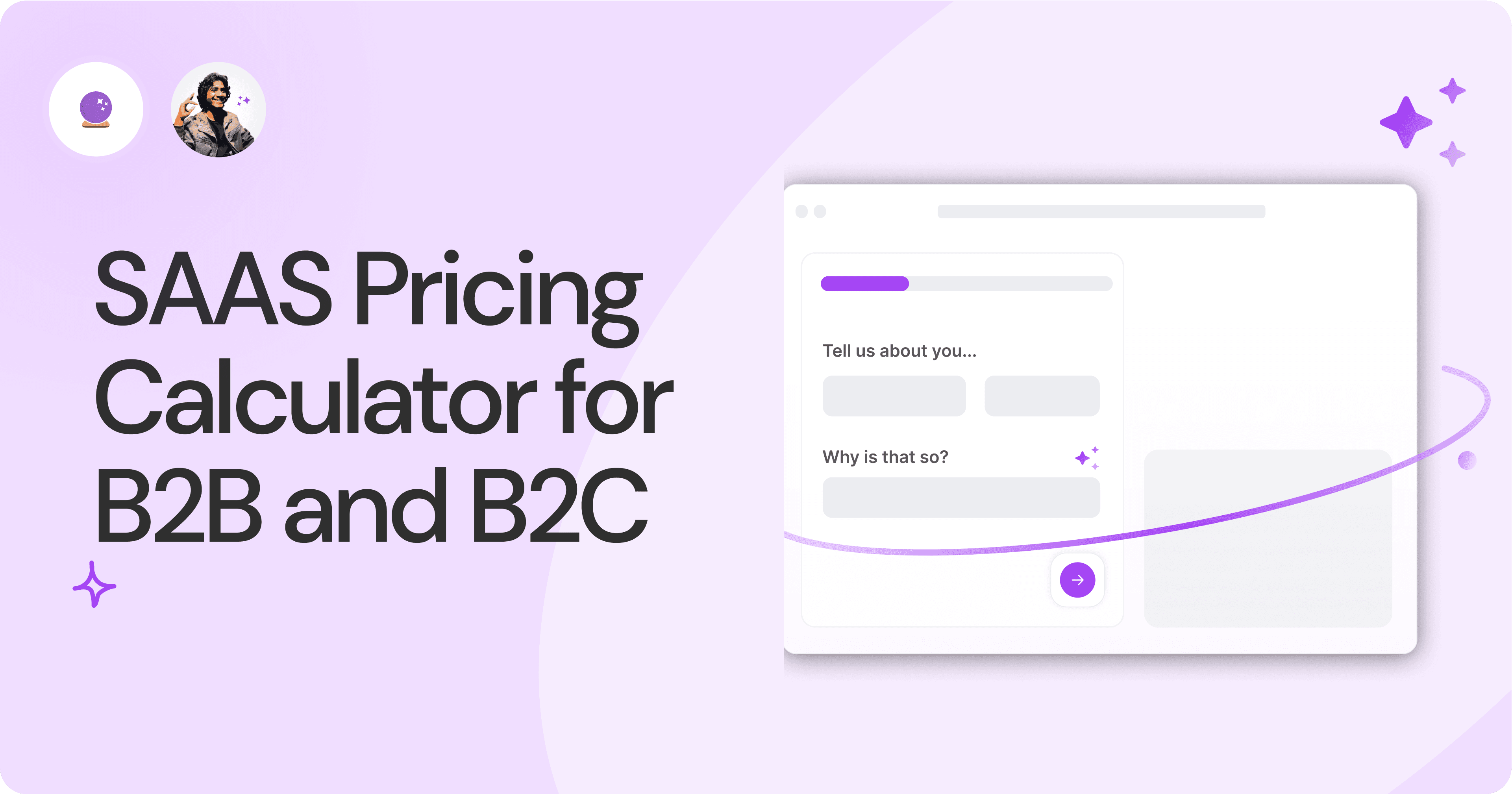
SAAS Pricing Calculators: B2B v B2C Online Forms.
The SaaS pricing calculator is an essential tool for both B2B and B2C SaaS companies. But how do you build it, right? We have you covered.
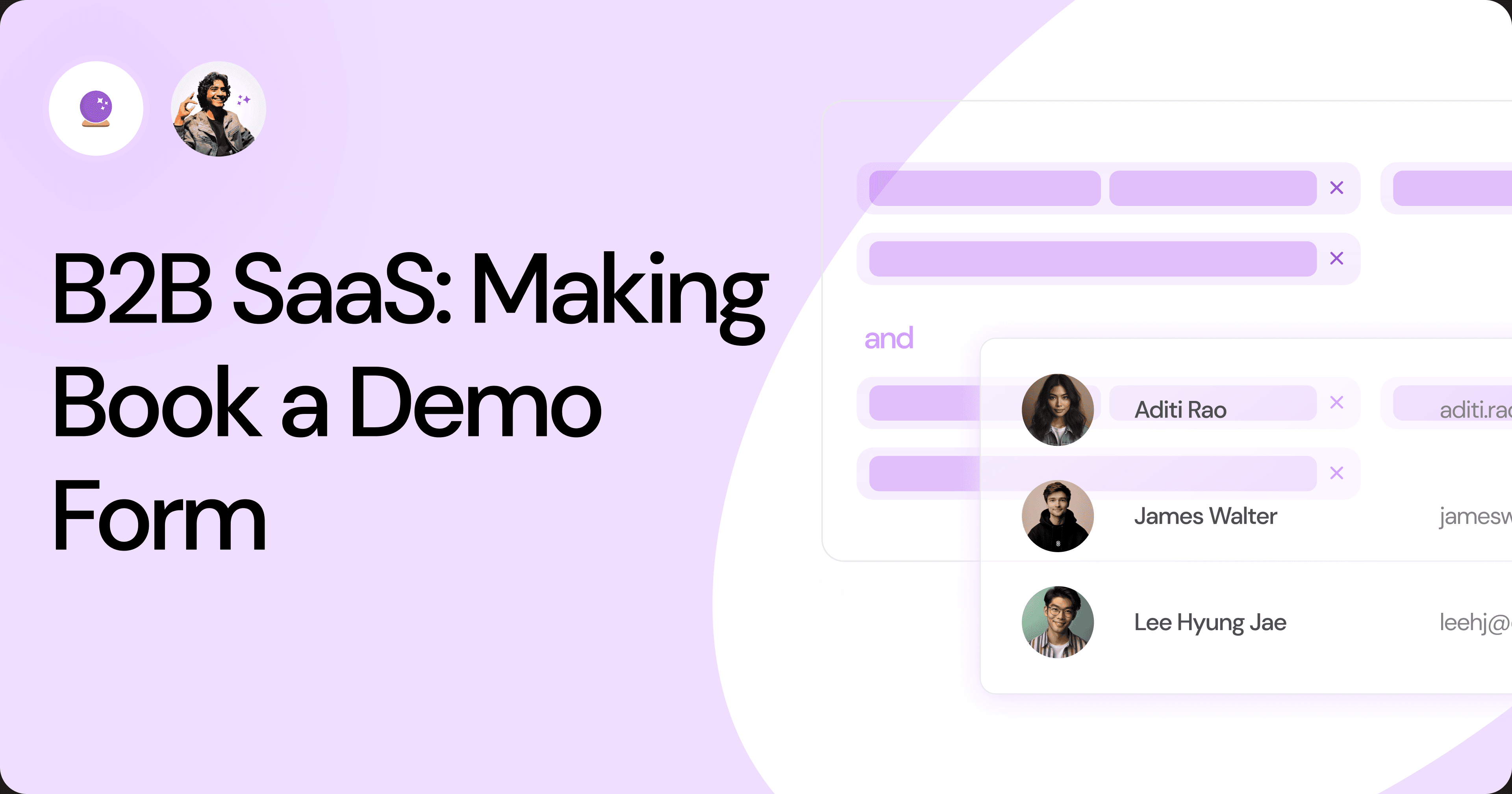
B2B SaaS: Making Book a Demo Form.
Having the perfect book a demo form for B2B SaaS is the first step in capturing leads. There are a few fundamental techniques to get this form right. Read on.

How to Get Started With SaaS Onboarding.
SaaS onboarding is essential for customer onboarding in B2B and B2C SaaS. Let’s understand its fundamentals, including the metrics.
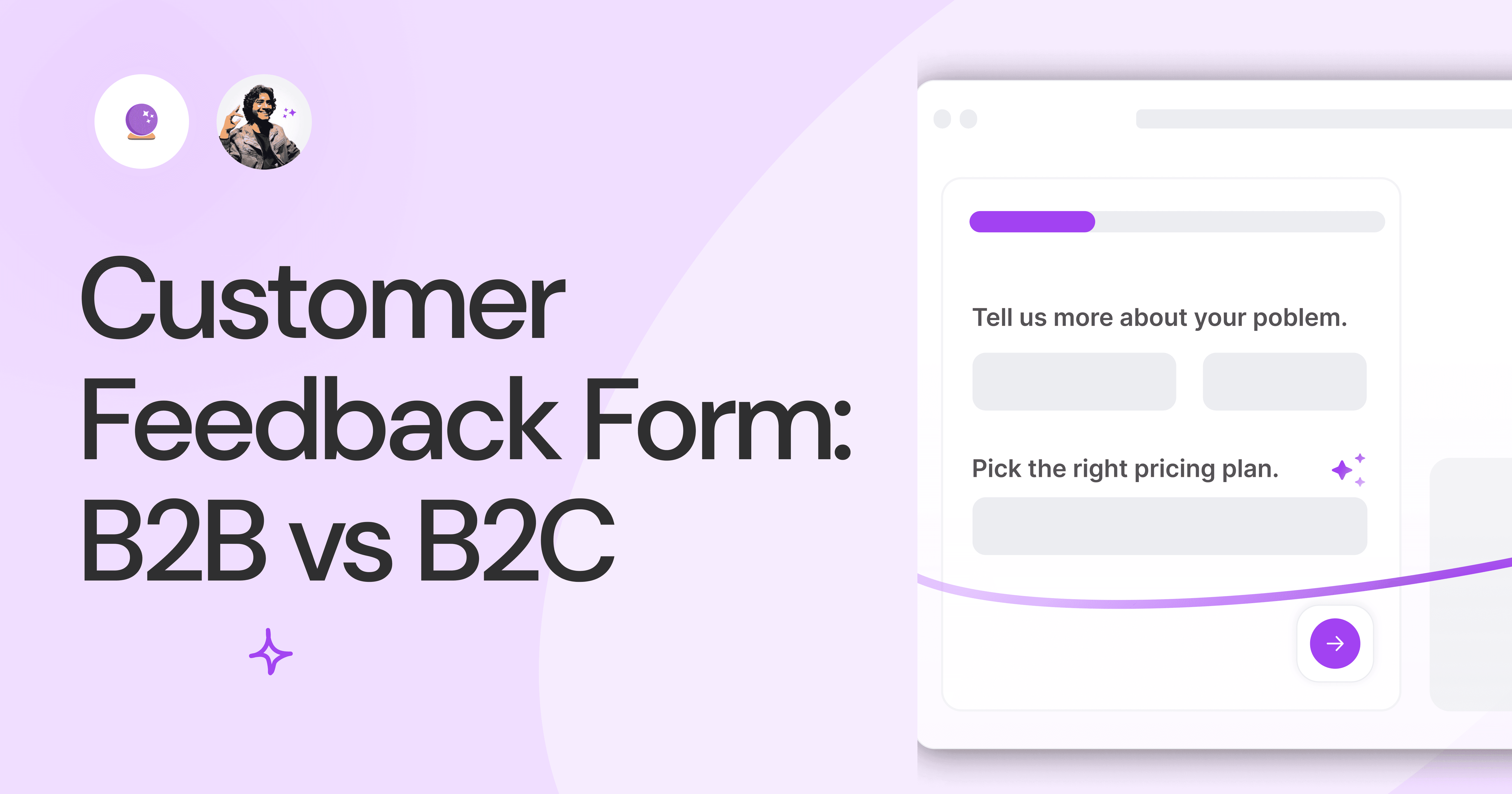
Customer Feedback Form: B2B vs B2C.
Why is customer feedback important? Because it dictates progress on B2B and B2B products and services for the customer to meet their goals.
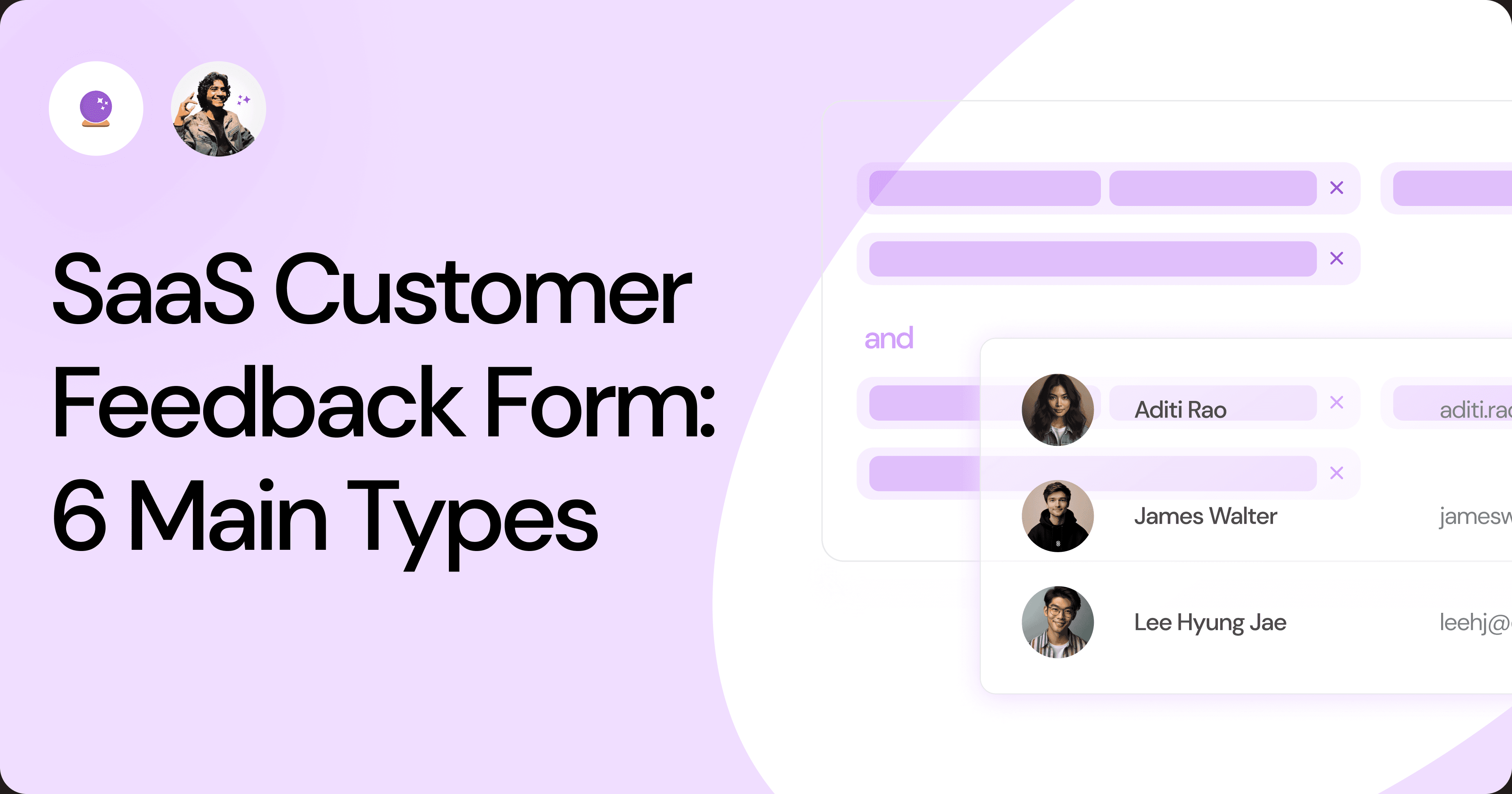
SaaS Customer Feedback Form: 6 Main Types.
As much as SaaS is self-serve, the role of a customer feedback form is highly relevant. There are different types, each with its use case and sections.
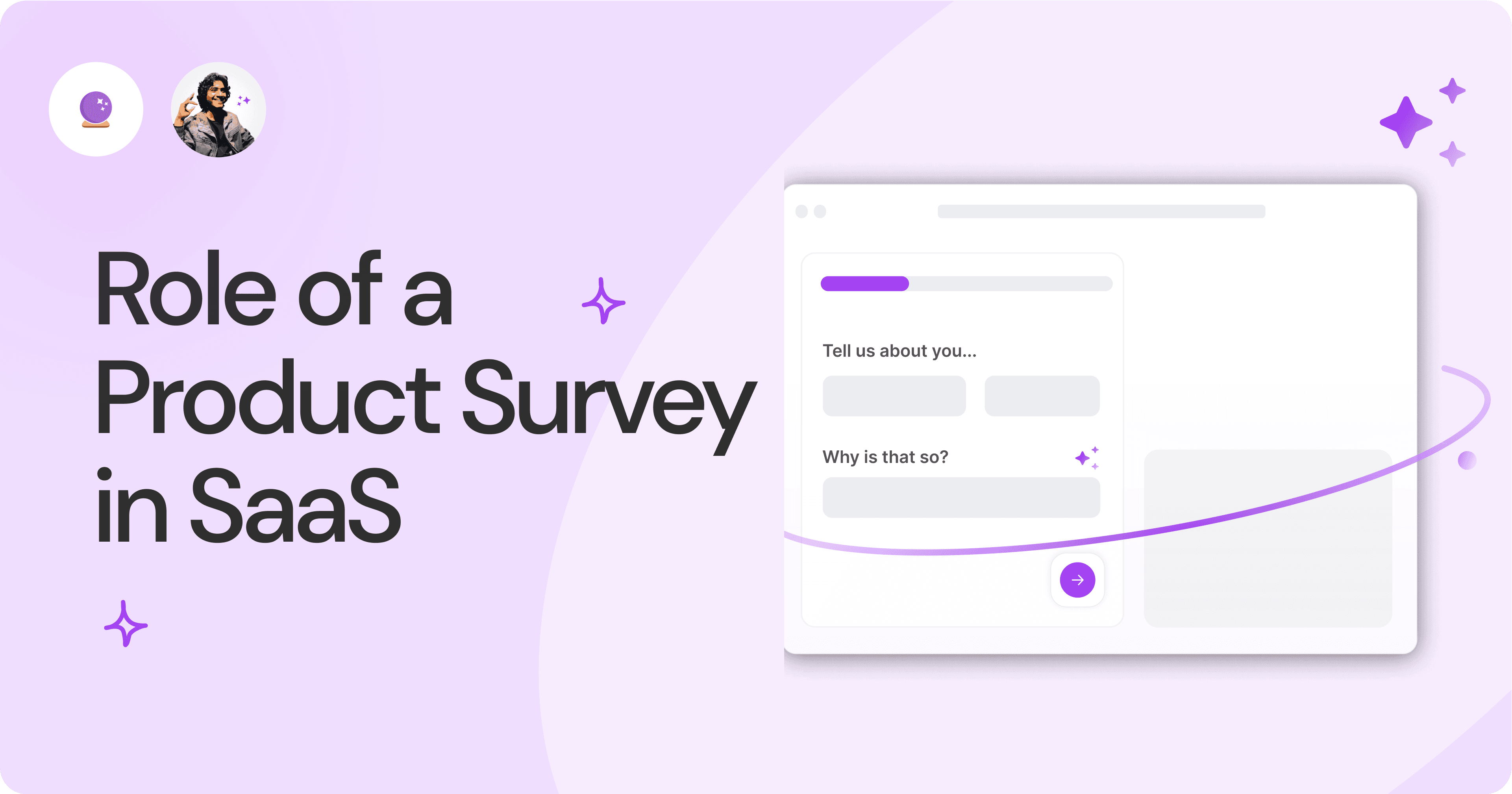
Role of a Product Survey in SaaS.
SaaS is all about creating products for specific use cases. This is where a product survey becomes all the more important to know the user deeply.

Should You Do a SaaS Market Survey?
Every SaaS company wants to grow fast. But without a market survey, growth isn't possible or sustainable. Let’s see how to do a market survey.

SAAS Pricing Calculators: B2B v B2C Online Forms.
The SaaS pricing calculator is an essential tool for both B2B and B2C SaaS companies. But how do you build it, right? We have you covered.

B2B SaaS: Making Book a Demo Form.
Having the perfect book a demo form for B2B SaaS is the first step in capturing leads. There are a few fundamental techniques to get this form right. Read on.

How to Get Started With SaaS Onboarding.
SaaS onboarding is essential for customer onboarding in B2B and B2C SaaS. Let’s understand its fundamentals, including the metrics.

Customer Feedback Form: B2B vs B2C.
Why is customer feedback important? Because it dictates progress on B2B and B2B products and services for the customer to meet their goals.

SaaS Customer Feedback Form: 6 Main Types.
As much as SaaS is self-serve, the role of a customer feedback form is highly relevant. There are different types, each with its use case and sections.

Role of a Product Survey in SaaS.
SaaS is all about creating products for specific use cases. This is where a product survey becomes all the more important to know the user deeply.

Should You Do a SaaS Market Survey?
Every SaaS company wants to grow fast. But without a market survey, growth isn't possible or sustainable. Let’s see how to do a market survey.

SAAS Pricing Calculators: B2B v B2C Online Forms.
The SaaS pricing calculator is an essential tool for both B2B and B2C SaaS companies. But how do you build it, right? We have you covered.

B2B SaaS: Making Book a Demo Form.
Having the perfect book a demo form for B2B SaaS is the first step in capturing leads. There are a few fundamental techniques to get this form right. Read on.

How to Get Started With SaaS Onboarding.
SaaS onboarding is essential for customer onboarding in B2B and B2C SaaS. Let’s understand its fundamentals, including the metrics.

Customer Feedback Form: B2B vs B2C.
Why is customer feedback important? Because it dictates progress on B2B and B2B products and services for the customer to meet their goals.

SaaS Customer Feedback Form: 6 Main Types.
As much as SaaS is self-serve, the role of a customer feedback form is highly relevant. There are different types, each with its use case and sections.

Role of a Product Survey in SaaS.
SaaS is all about creating products for specific use cases. This is where a product survey becomes all the more important to know the user deeply.

Should You Do a SaaS Market Survey?
Every SaaS company wants to grow fast. But without a market survey, growth isn't possible or sustainable. Let’s see how to do a market survey.
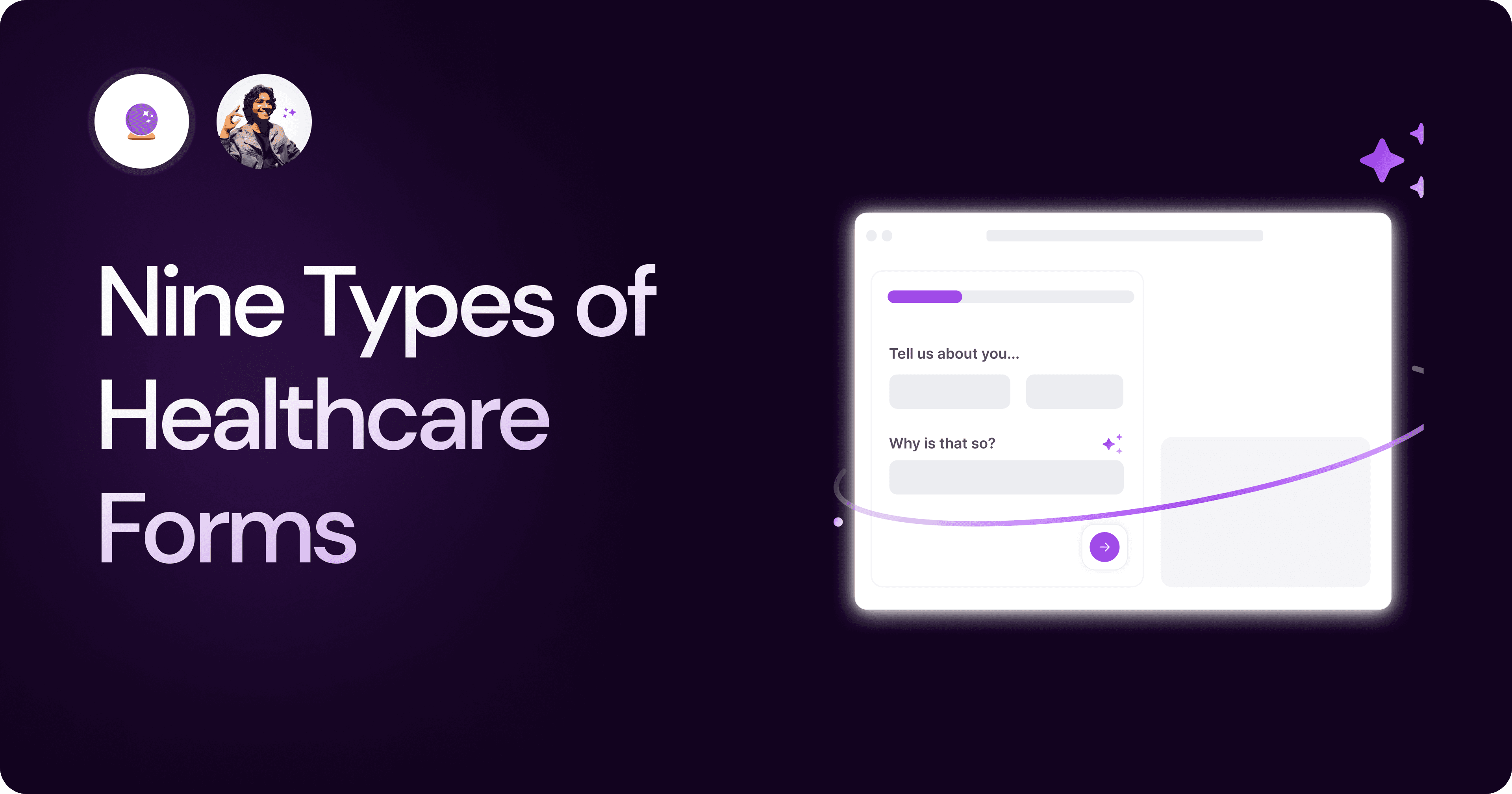
Nine Types of Healthcare and Medical Forms.
Medical forms are a must-have for any healthcare business or practitioner. Learn about the different kinds of medical and healthcare forms.
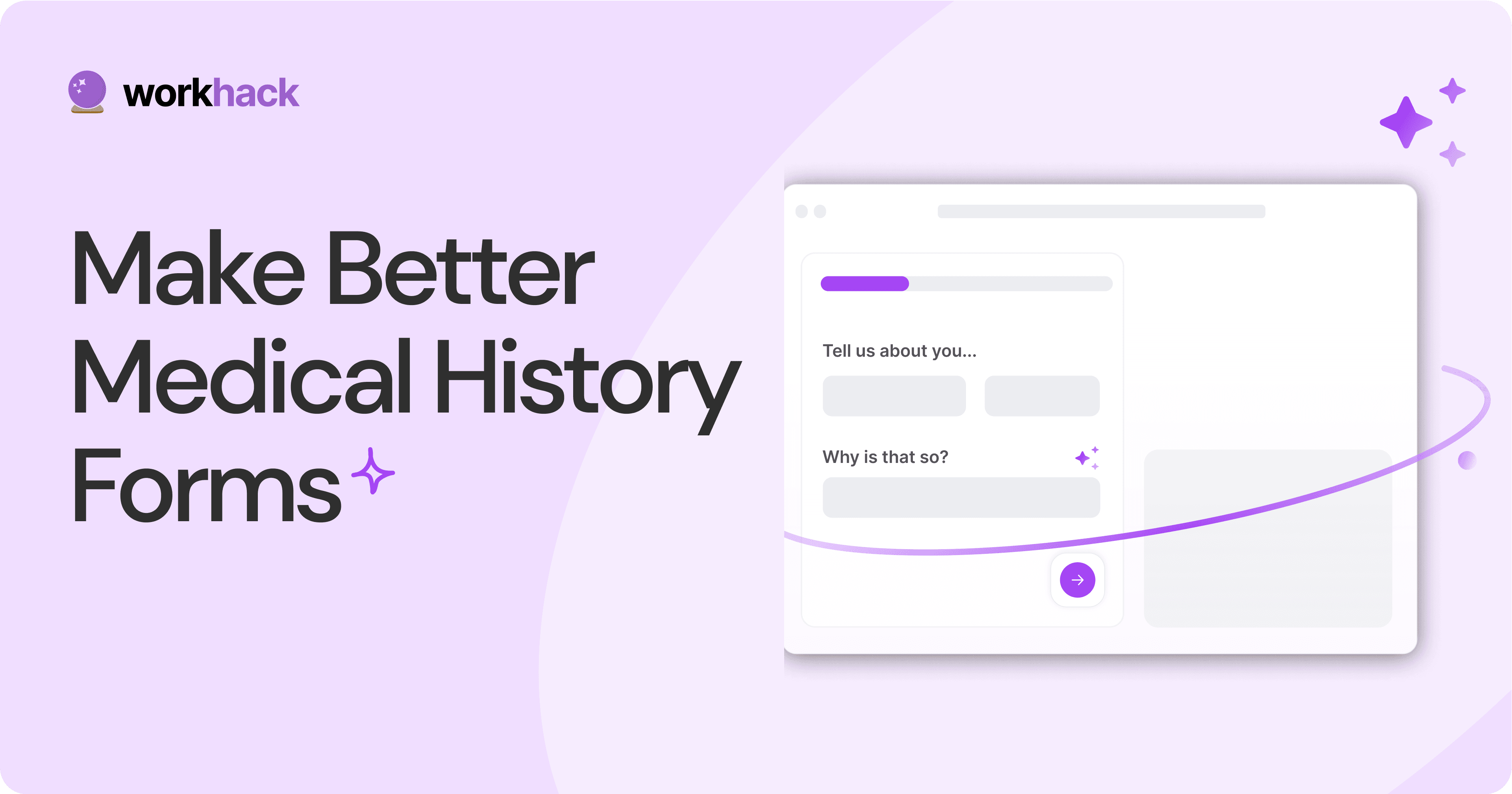
4 Tips for Better Medical History Forms.
Medical history forms are central to patient care, onboarding, and medical administration records. Learn how to make them easier to fill.
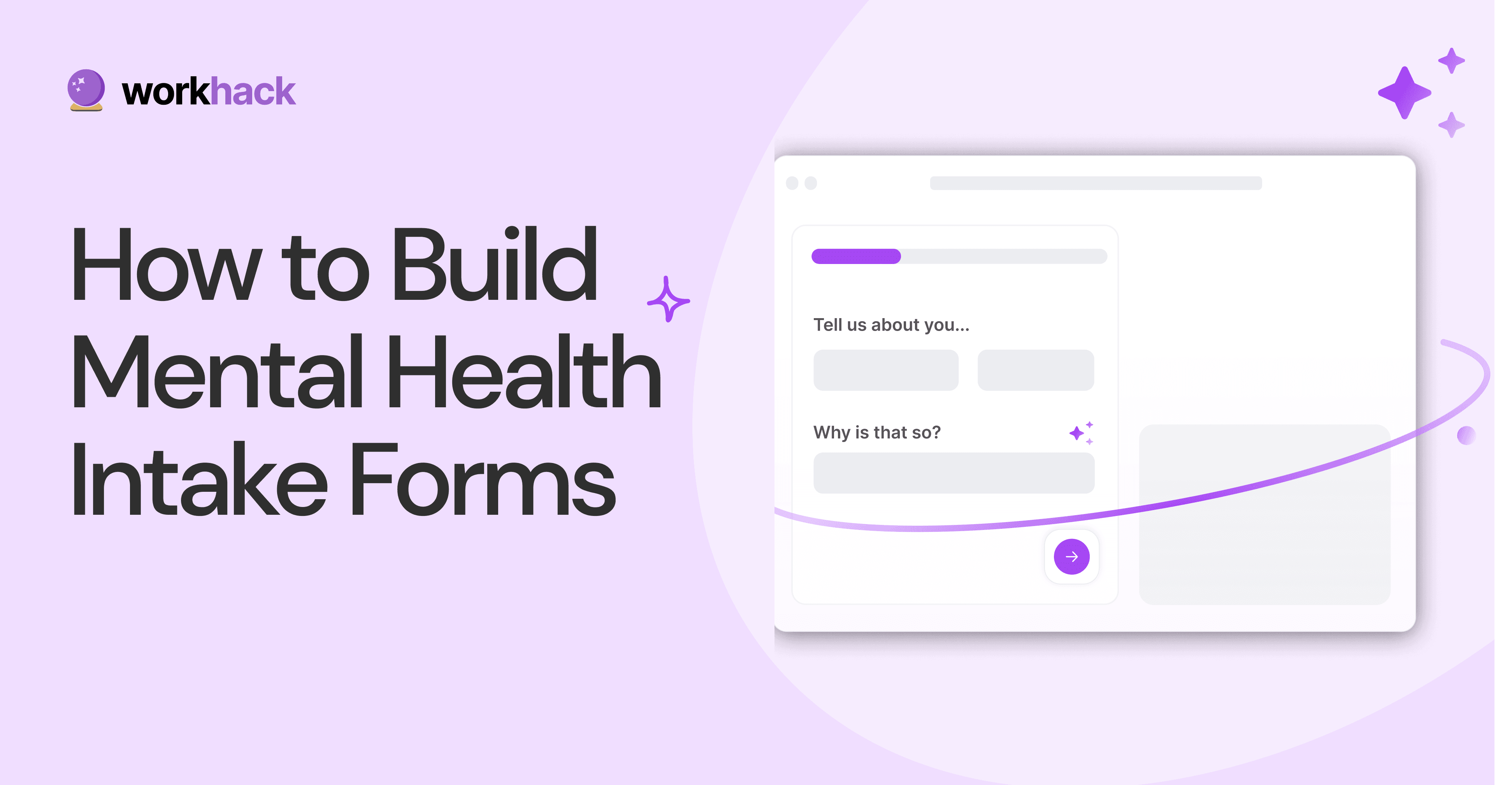
How to Build Mental Health Intake Forms?
Mental health intake forms are not like patient intake forms. Mental health intake forms deal with far more sensitive data and have specific design methods.
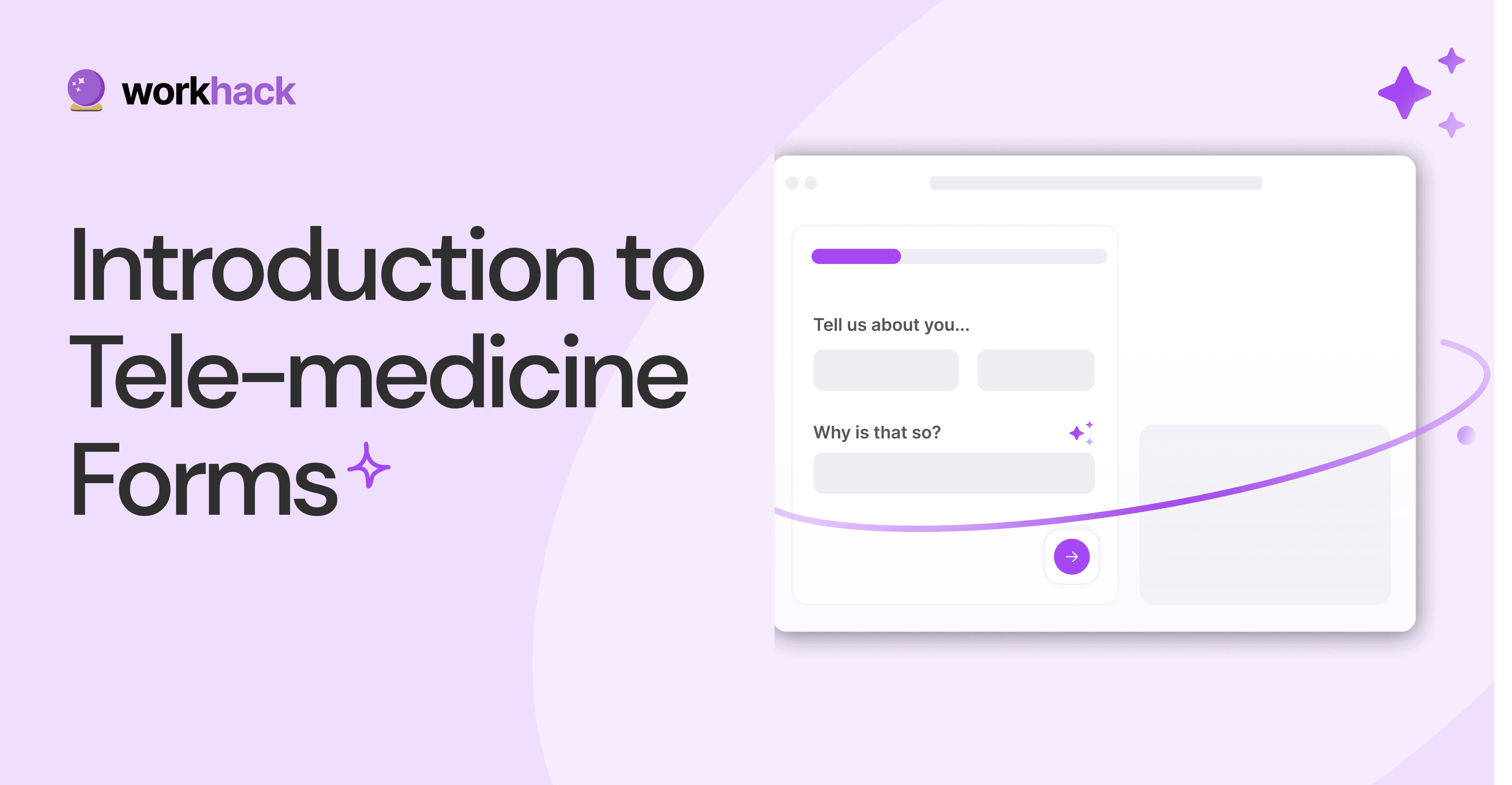
What, Why and How of Telemedicine Forms.
Telemedicine is on the rise and with different form builders out there, which one best suits your needs as a healthcare services provider?

3 Reasons for Major Drop-Offs in Medical Forms.
No matter which healthcare form we pick, there are major drop-off reasons. We shall dive into the top 3 and learn how to resolve them in your next form.
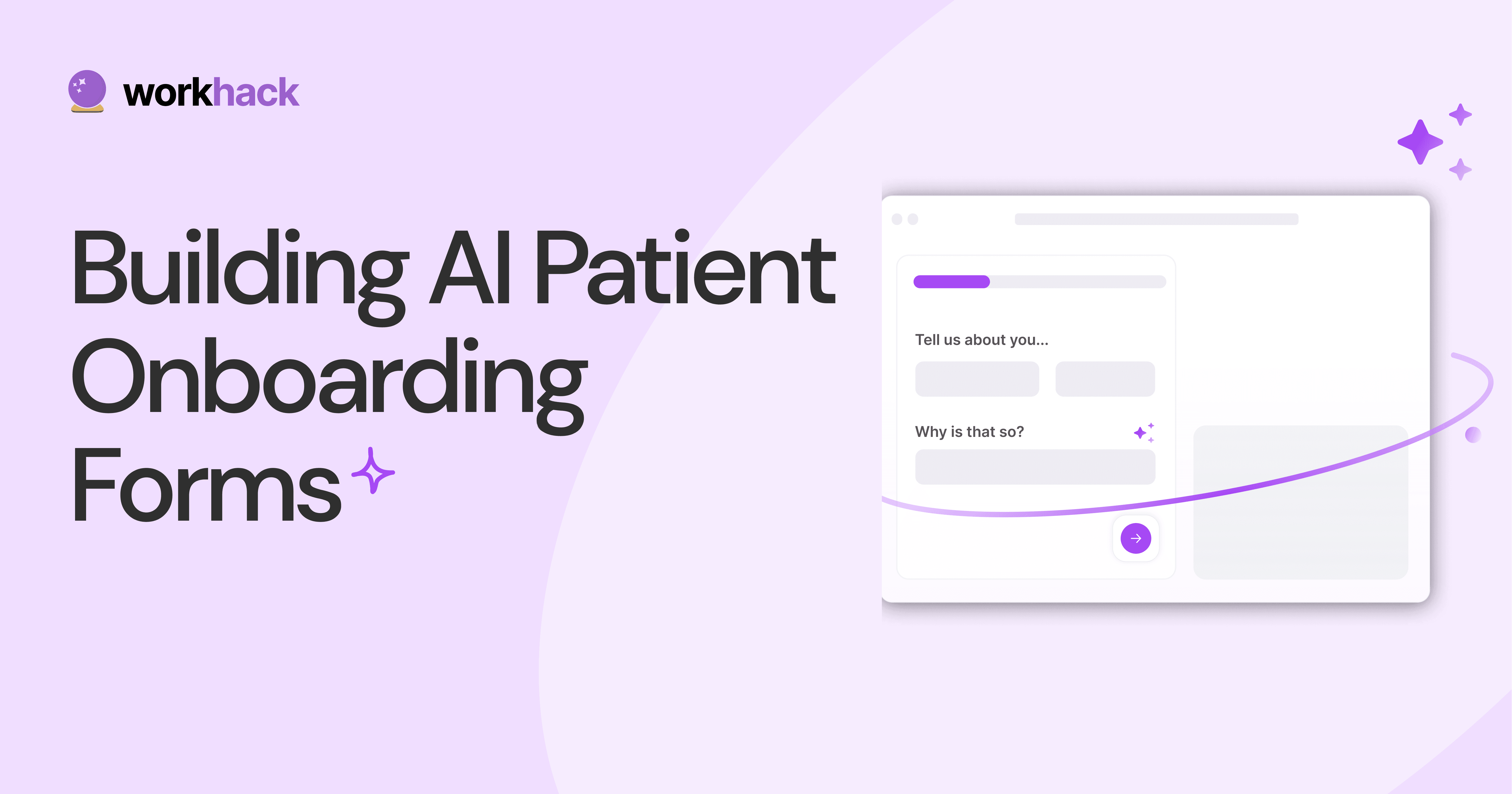
Patient Onboarding Forms - From Click to Clinic.
Patient onboarding forms are the first touchpoint for patients; getting this right for higher conversion rates is a must-have. Learn how to perfect them now.
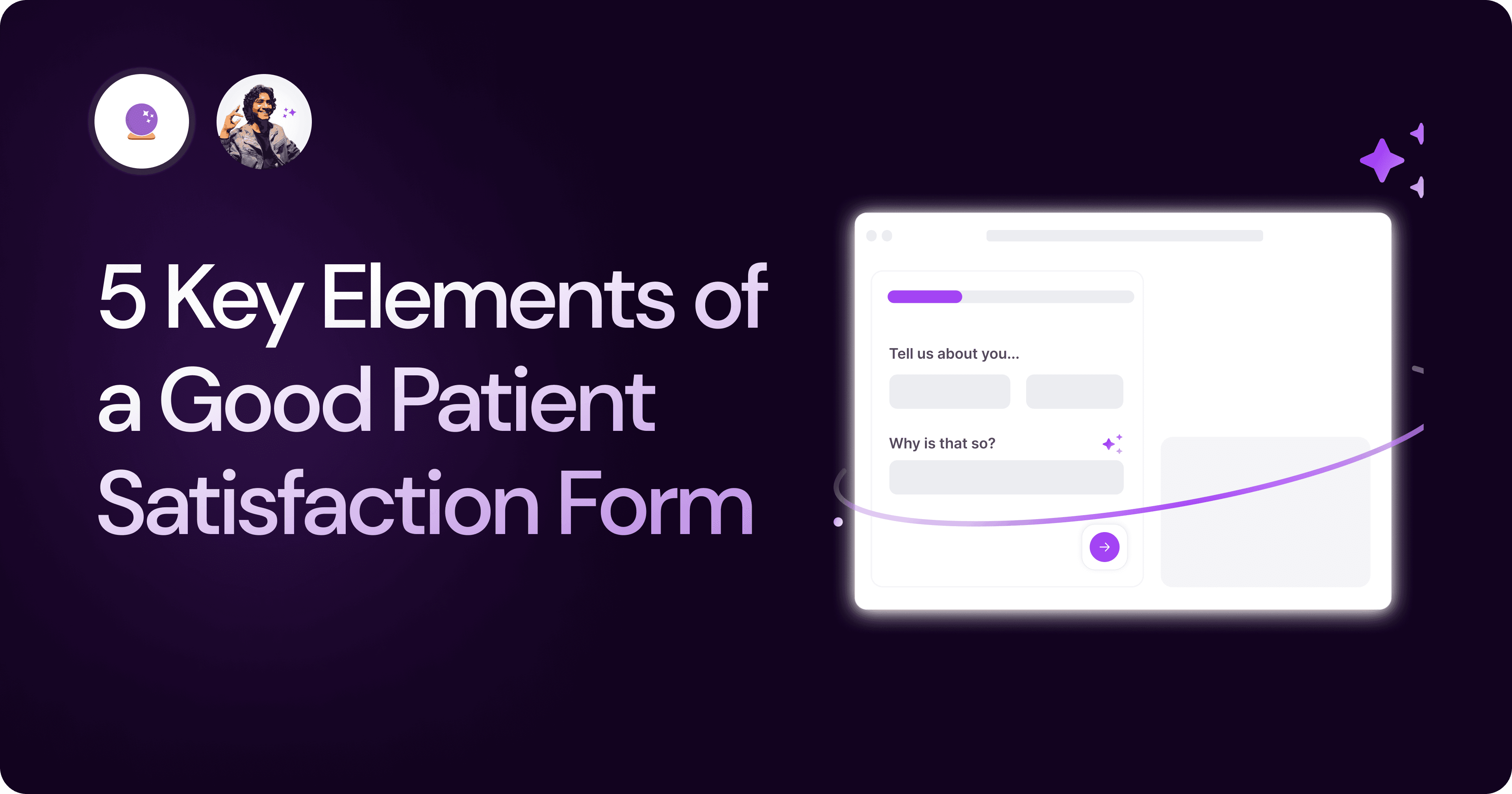
5 Key Parts of a Good Patient Satisfaction Form.
The goal of patient satisfaction surveys is to course-correct the services of a healthcare provider. Patient feedback leads to a culture of patient-centric care.
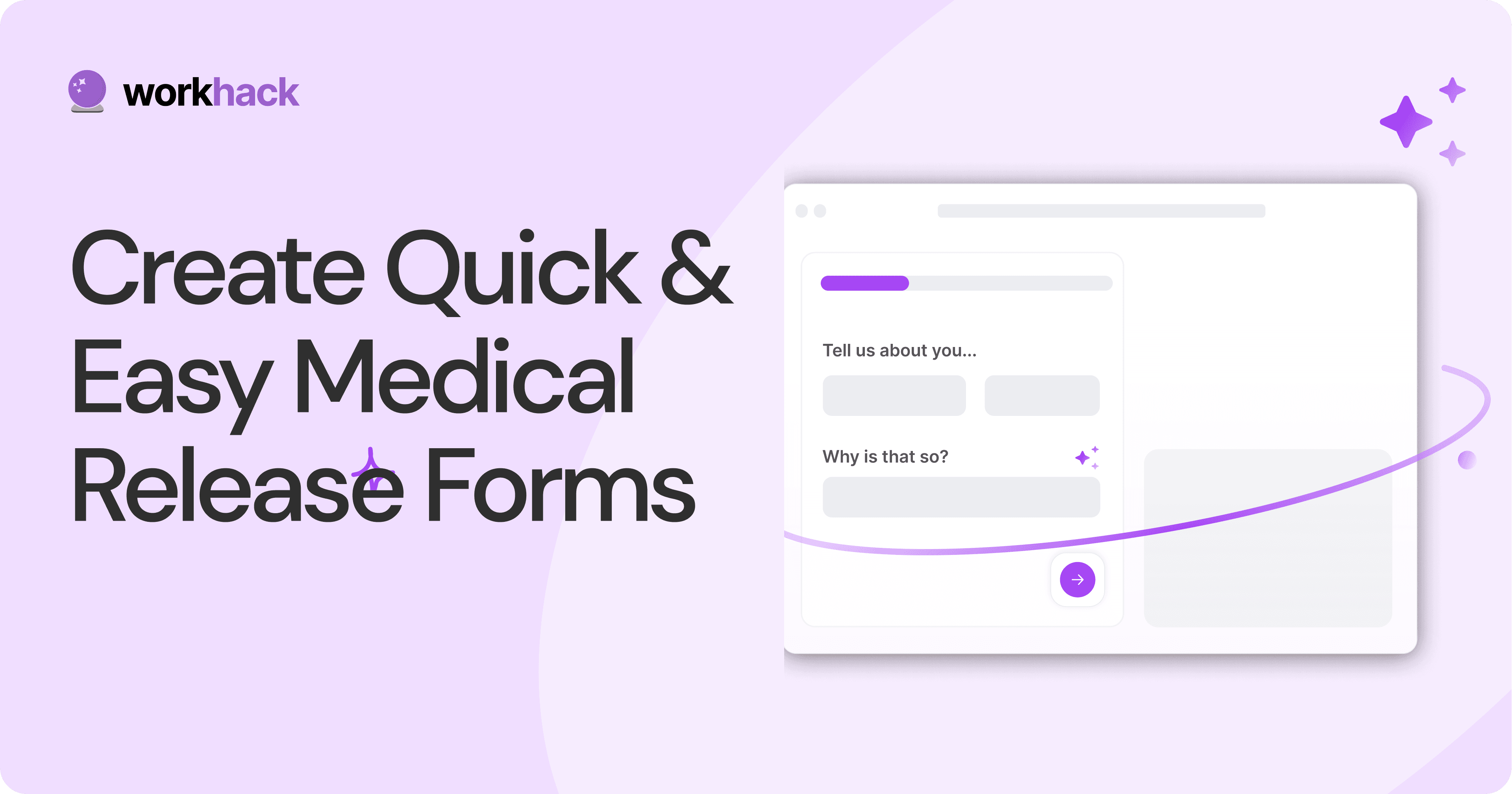
Build Quick and Easy Medical Release Forms.
Every HIPAA-compliant healthcare provider comes across medical release forms that involve details from medical history forms. Can they be shipped fast? Yes.

SAAS Pricing Calculators: B2B v B2C Online Forms.
The SaaS pricing calculator is an essential tool for both B2B and B2C SaaS companies. But how do you build it, right? We have you covered.

B2B SaaS: Making Book a Demo Form.
Having the perfect book a demo form for B2B SaaS is the first step in capturing leads. There are a few fundamental techniques to get this form right. Read on.

How to Get Started With SaaS Onboarding.
SaaS onboarding is essential for customer onboarding in B2B and B2C SaaS. Let’s understand its fundamentals, including the metrics.

Customer Feedback Form: B2B vs B2C.
Why is customer feedback important? Because it dictates progress on B2B and B2B products and services for the customer to meet their goals.

SaaS Customer Feedback Form: 6 Main Types.
As much as SaaS is self-serve, the role of a customer feedback form is highly relevant. There are different types, each with its use case and sections.

Role of a Product Survey in SaaS.
SaaS is all about creating products for specific use cases. This is where a product survey becomes all the more important to know the user deeply.

Should You Do a SaaS Market Survey?
Every SaaS company wants to grow fast. But without a market survey, growth isn't possible or sustainable. Let’s see how to do a market survey.
Subscribe to stay updated.
Subscribe to stay updated.
Subscribe to stay updated.
HC

HC

HC

HC

70+ people from across industries read our emails.
HC

HC

70+ people from across industries read our emails.
HC

HC

HC

70+ people from across industries read our emails.




Bangalore, India / San Francisco, US
WorkHack Inc. 2023
Bangalore, India
San Francisco, US
WorkHack Inc. 2023
WorkHack Inc. 2023
Bangalore, India / San Francisco, US
WorkHack Inc. 2023
Bangalore, India / San Francisco, US



